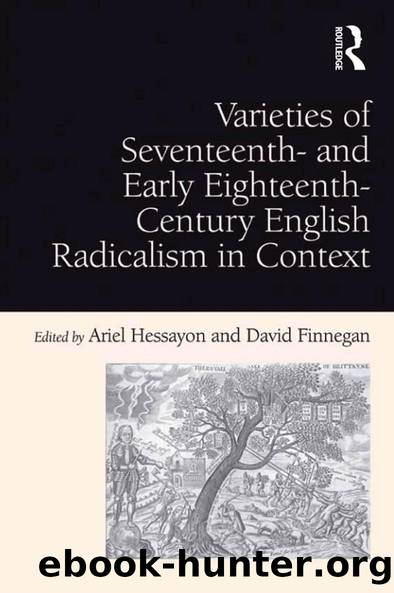Varieties of Seventeenth- and Early Eighteenth-Century English Radicalism in Context by David Finnegan Ariel Hessayon

Author:David Finnegan, Ariel Hessayon [David Finnegan, Ariel Hessayon]
Language: eng
Format: epub
Tags: History, General
ISBN: 9781409482215
Google: n6uoHx_nuxIC
Publisher: Ashgate Publishing, Ltd.
Published: 2013-07-28T16:13:00+00:00
The champions of empire in the 1650s â Milton, Sidney, Nedham, Harrington, Waring, Dillingham, Hawke and others â exhibited a variety of sometimes overlapping political positions. They included Independents, classical republicans, Protestant providentialists and de facto theorists. What they shared besides their imperialism was an ingrained and impregnable sense of English superiority â undergirded, more often than not, by a belief in Englandâs destiny as an elect Nation. Hawke, for example, simply could not conceive of the possibility that the conquered peoples might not welcome the communication of English privileges, laws and language with anything less than unmixed gratitude. Similarly, Commonwealth promises of social, legal and economic reform for Scotland and Ireland were couched in terms of rooting out archaic and inequitable practices and dragging those backward nations into line with English standards. The national cultural confidence is palpable: âfuture generations, we hope, shall acknowledge that the English laws and government introduced into Ireland, shall be as new life to the natives, and yet the incorporation that is intended of both nations, shall make the Irish great gainers by al their lossesâ.69 Nor, in the 1659 parliamentary debates, were the âScottishâ and âIrishâ members willing to cede an inch of their Englishness. Some had ânever saw Scotland, but in a mapâ, while Sir Thomas Stanley stated âI am not to speak for Ireland, but for the English in Ireland ⦠The members for Ireland, and the electors, are all Englishmen.â But perhaps this pride of race is best caught in one Colonel Parsonsâ happy formula that the House, âdeal no less kindly with the Irish than with the Scotch. They are all English.â70 As ethnography this is flat nonsense. As a statement of imperial policy and legal doctrine, any citizen of the Roman Empire would have understood and applauded.
Download
This site does not store any files on its server. We only index and link to content provided by other sites. Please contact the content providers to delete copyright contents if any and email us, we'll remove relevant links or contents immediately.
| Africa | Americas |
| Arctic & Antarctica | Asia |
| Australia & Oceania | Europe |
| Middle East | Russia |
| United States | World |
| Ancient Civilizations | Military |
| Historical Study & Educational Resources |
Machine Learning at Scale with H2O by Gregory Keys | David Whiting(4296)
Never by Ken Follett(3937)
Fairy Tale by Stephen King(3370)
Oathbringer (The Stormlight Archive, Book 3) by Brandon Sanderson(3161)
The Man Who Died Twice by Richard Osman(3072)
Will by Will Smith(2911)
Rationality by Steven Pinker(2352)
Can't Hurt Me: Master Your Mind and Defy the Odds - Clean Edition by David Goggins(2324)
The Dark Hours by Michael Connelly(2300)
Friends, Lovers, and the Big Terrible Thing by Matthew Perry(2219)
The Dawn of Everything: A New History of Humanity by David Graeber & David Wengrow(2197)
Principles for Dealing With the Changing World Order: Why Nations Succeed and Fail by Ray Dalio(2043)
A Short History of War by Jeremy Black(1843)
HBR's 10 Must Reads 2022 by Harvard Business Review(1840)
Go Tell the Bees That I Am Gone by Diana Gabaldon(1754)
A Game of Thrones (The Illustrated Edition) by George R. R. Martin(1725)
Kingdom of Ash by Maas Sarah J(1668)
515945210 by Unknown(1662)
443319537 by Unknown(1546)
